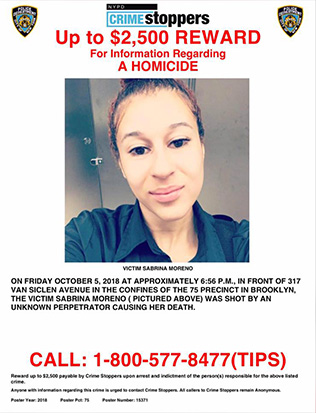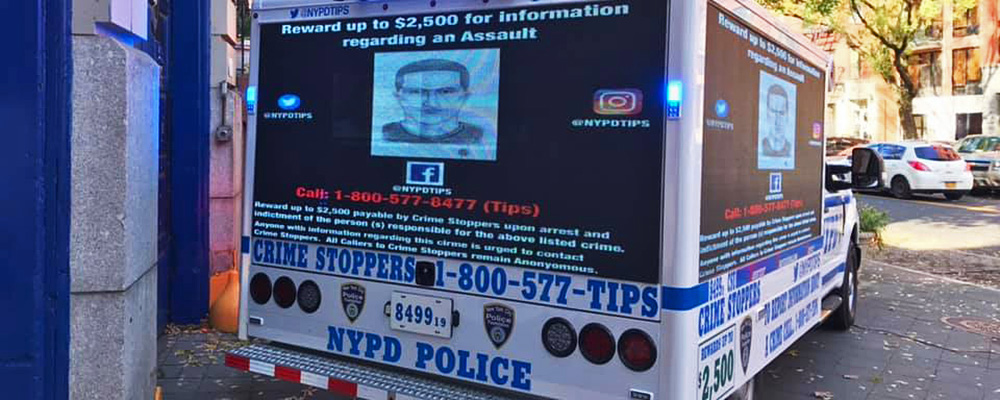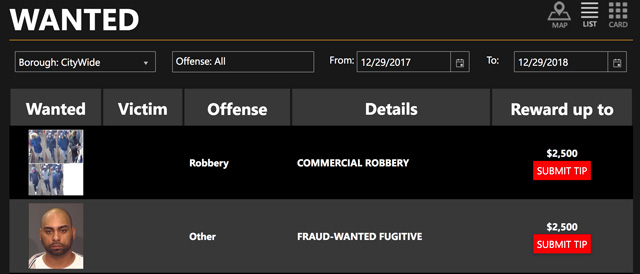The NYPD unveiled a new Crime Stoppers truck on November 14, 2018. Crime Stoppers’ 1-800-577-TIPS hotline, nypdcrimestoppers.com URL, and CRIMES (274367) text-to-submit number, and social media channels, will be shown on LED screens.
By Wayne Townsend
Have you ever driven past a billboard, or walked past a flyer on a lamppost that read “Reward for information leading to an arrest call Crime Stoppers,” and wondered if it works? According to the New York City Police Foundation (NYCPF), a non-profit, privately funded organization, it does, to the tune of over 1,500 murders or attempted murders solved and more than 2,200 robberies.
Over 9,000 suspects have been arrested and $2.4 million of reward money has been paid out since the foundation took over Crime Stoppers in the early 1980s, according to statistics provided by the NYCPF. The reward money paid represents approximately two-thirds of the funds eligible to be collected, the remaining third is never claimed. The foundation executive director, Gregg Roberts, chalks this up to “conscientious citizens who want to do their part.”
Crime Stoppers is a private, public partnership, says Roberts. “You got the community, the detectives, and in some cases the media getting involved. We are basically the means for the public to support innovative programs in effort to keep New York City safe.”
The NYCPF doesn’t track all the calls made. Its tracking system only charts the rewards that are directly tied to individual cases. The success rate numbers are a bit skewed and actually higher due to the fact that many times one arrest can close a number of cases. “That’s because the suspect is guilty of multiple crimes,” Roberts said. “This program is about shared responsibility. We have been doing it for a long time, and it’s been proven to be a very effective way of helping the police keep our streets safe.”
Anyone can leave a tip by calling, texting, or email. Phone numbers and IP addresses are never recorded. Tipsters are given a code number and told to follow up at a specific time which allows detectives time to investigate the information provided. Once verified by an arrest or indictment, tipsters are given a reference number. This allows them to contact the appropriate individuals through the hotline, when they are given instructions on how to pick up the reward.
Some tipsters volunteer to be witnesses, but Roberts made it clear that the hotline never asks anyone to give up his or her anonymity. The reward system is designed for felonies, although any crime that does not fall in the hotline’s purview is routed to the proper NYPD channels for further investigation.
“This program is 100 percent funded by donations and it is the best bang for your buck,” Roberts said. “Your $1000 helps take that murderer off the street.”
 The NYCPF’s achievements aren’t limited to Crime Stoppers. Since its inception in 1971, the organization spearheaded the first ballistic protective vest worn by NYPD officers and created the Real Time Crime Center, said Roberts. The foundation also sponsored the International Liaison Program, which places NYPD investigators in foreign cities around the world to collect intelligence.
The NYCPF’s achievements aren’t limited to Crime Stoppers. Since its inception in 1971, the organization spearheaded the first ballistic protective vest worn by NYPD officers and created the Real Time Crime Center, said Roberts. The foundation also sponsored the International Liaison Program, which places NYPD investigators in foreign cities around the world to collect intelligence.
The canines that populate NYPD Counterterrorism operations were purchased and trained with money provided by the foundation. These dogs can maneuver through large crowds, picking up on airborne particles that may have been left by anyone who has handled explosive materials. The foundation also supports the citywide NYPD program known as Neighborhood Policing, which has officers who are direct liaisons between the community leaders, store owners, and residents. This program has expanded into Build the Block, which encourages people to invest time in their communities and fosters trust of the NYPD. The NYCPF also provided the seed funding for the body cameras worn by patrol officers, which allowed the department to test and experiment with the technology before the city agreed to purchase it for the entire department.
“All of this,” said Roberts, “threads through Crime Stoppers. It is the heart of neighbor policing, and we wouldn’t have been able to come this far without the successes we have experienced through Crime Stopper Program.”
The number to call the report a crime is 800 577-TIPS (8477).
For further information about The New York City Police Foundation and all the programs supported by them, visit the website: https://www.nycpolicefoundation.org/




